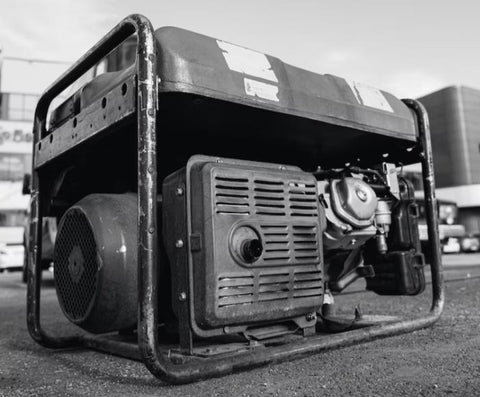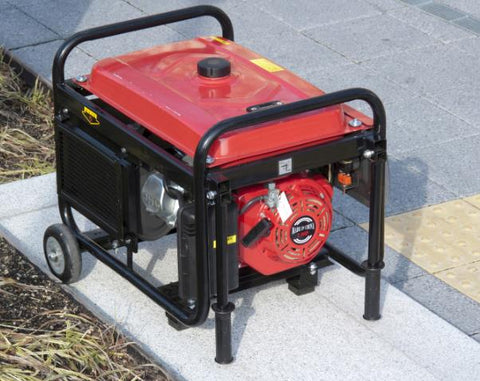
What Is Dual Fuel Generator and How Does It Work?
We live in a world constantly running on electricity, and a power outage, even for a day, can cause massive losses. Generators are helpful to have around in case of a power outage to prevent disrupting any business operation.
Dual fuel generators can run on two different power sources, making them quite popular and efficient, whether using them at home, for recreation, or for business. However, before you get a dual-fuel generator, you need to learn more about the appliance to maintain and use it efficiently. In this article, we'll explore dual-fuel generators, how they function, their pros and cons, and the differences between fuel generator and portable power stations.
What Is the Dual Fuel Generator?

A dual-fuel generator is designed to operate on two fuel types, the most common being propane and gasoline; some also run on diesel and natural gas. When using this type of generator, you can turn on both fuels simultaneously or use one fuel source. This feature differentiates it from the bi-fuel generator, which, despite having accommodation for two fuel sources, cannot use them simultaneously.
One of the main reasons why dual-fuel generators are popular is due to versatility. They enable you to use the two fuel sources together to produce the same wattage and lifespan that you need without limiting you to only one type of fuel. Therefore, dual-fuel generators are ideal for running large appliances and for those living off the grid.
How Does a Dual Fuel Generator Function?
Dual generators have two different power sources that run the engine. They can use the available fuel, and there is also a backup option if you choose not to use them simultaneously. Operating one is relatively easy since it comes with a manual. First, you need to decide the type of fuel you want to use, fill the tank or both tanks and then connect the power cable from your generator to your home.
If the first one runs low, the generator will automatically switch over to the other fuel supply, so you don't have to worry about switching it manually. However, you should always ensure that at least one fuel tank is full because running out of gas can cause the generator coils to lose their magnetism, making it harder to restart. Low fuel also reduces the heat in the cylinder, which might lead to oil and fuel deposits leaking through the slip joints in the exhaust.
Running the generator some distance from your home is advisable since they produce toxic gas emissions like carbon monoxide, which pose a health risk to all occupants, including any pets you might have. Additionally, clogged pipes or exposed wires in your generator can be a fire hazard, so ensure your generator is well maintained and checked for any loose wires in the cables.
Benefits of Dual Fuel Generators
Some benefits of using dual-fuel generators compared to single and bi-fuel generators include:
Better Fuel Efficiency
To maximize your electricity output, consider purchasing a dual-fuel generator. Dual-fuel generators have better fuel efficiency making them more economical. They can run even on low fuel due to a highly efficient engine that produces optimum power for every unit of fuel, making them cost-effective and saving you money in the long run.
Eco-Friendly Performance
Dual-fuel generators are more environmentally friendly than standard generators, which run on either gasoline or diesel. Most dual-fuel generators have a highly efficient generator and use cleaner propane, reducing toxic gas emissions.
Drawbacks of Dual Fuel Generators

Despite dual-fuel generators being versatile and eco-friendly, there also have a few drawbacks.
Gas Storage Challenges
Gasoline has a short lifespan, making it harder to store; if your dual-fuel generator uses gasoline, you must make sure you use it as soon as you get it. If you intend to store it, you need to get a stabilizer which is a bit expensive and adds to operation costs. Some states also have a limit on how much gas you can store since gas is a fire hazard.
Maintenance Needs
Dual-fuel generators are more expensive to maintain compared to single-fuel generators. You'll need to keep them well-maintained to ensure they work efficiently; this includes cleaning the fuel systems regularly to avoid clogged pipes and ensuring the propane tank is always filled. Before investing in a dual-fuel generator, ensure it has easy access to all the tanks to make it easy to clean.
Portable Power Station vs Dual Fuel Generator - Which is Better?
The choice between a portable power station and a dual fuel generator depends on your specific needs and preferences. Here are some factors to consider when comparing the two:
Power Output
Portable power stations typically provide lower power outputs compared to dual fuel generators. If you require high wattage for running power-hungry appliances or tools, a dual fuel generator may be a better option.
Fuel Options
Dual fuel generators can run on multiple fuel sources, usually gasoline and propane. This versatility allows you to choose the fuel option that is more readily available or convenient for your situation. On the other hand, portable power stations are typically powered by rechargeable batteries and do not require fuel.
Noise Level
Dual fuel generators tend to produce more noise during operation compared to portable power stations. If noise is a concern, especially in camping or residential areas, a portable power station may be a quieter alternative.
Portability:
Portable power stations are designed to be lightweight and easy to carry, making them suitable for outdoor activities or situations where mobility is essential. Dual fuel generators are usually larger, heavier, and may require wheels or handles for transportation.
Emissions:
Dual fuel generators that run on gasoline produce exhaust emissions, which can be a consideration if you prefer a cleaner and more environmentally friendly option. Portable power stations generate zero emissions since they rely on battery power.
Maintenance:
Dual fuel generators require regular maintenance, including fuel refills, oil changes, and spark plug replacements. Portable power stations, being battery-powered, generally require less maintenance.
Cost:
Dual fuel generators tend to be more expensive upfront compared to portable power stations. Additionally, the ongoing cost of fuel should be factored in. Portable power stations may have a higher initial cost but generally have lower operating costs since they do not require fuel.
Why you should consider Anker?
The Anker PowerHouse 767 offers several compelling features that make it a suitable choice for various applications. Here's a description of why you might consider choosing the Anker PowerHouse 767 based on the provided information:
Long-Lasting Technology (InfiniPower™):
The InfiniPower™ technology used in the PowerHouse 767 indicates that it has an efficient power management system, allowing for longer-lasting battery life. This means you can rely on it to provide power for extended periods, whether you're camping, engaging in outdoor activities, or facing a power outage.
High Power Output:
With a 2400W capacity and 2048Wh of energy storage, the PowerHouse 767 can deliver substantial power to run various devices and appliances. This versatility ensures that you can charge or operate multiple devices simultaneously, making it useful for powering laptops, smartphones, portable refrigerators, lights, and more.
Expansion Battery:
The PowerHouse 767 offers the option to connect an expansion battery, providing an additional 4096Wh of power. This feature allows for even more energy storage, granting you the flexibility to handle longer durations or higher power demands.
Solar Input:
The inclusion of a 1000W solar input makes the PowerHouse 767 compatible with solar panels, enabling you to harness renewable energy to recharge the power station. This solar charging option can be especially beneficial in situations where access to conventional power sources is limited or during outdoor adventures.
Fast Charging System (GaNPrime™):
The GaNPrime™ fast charging system ensures that the PowerHouse 767 can recharge quickly. This feature reduces downtime and allows you to replenish the power station rapidly, ensuring it's ready for use whenever you need it.
Portable and Durable:
The PowerHouse 767 is designed with portability in mind, making it easy to carry and transport. Its durable construction ensures that it can withstand the rigors of outdoor environments, making it a reliable companion for camping trips, RV adventures, or emergency situations.
TT-30 Port for RV:
The inclusion of a TT-30 port specifically for RVs adds to the PowerHouse 767's versatility. This port allows you to connect the power station directly to your RV's power system, providing a convenient and reliable power source while on the road.
Overall, the Anker PowerHouse 767 combines high power output, expandability, solar charging capability, fast charging, portability, and compatibility with RVs. These features make it a compelling choice for those seeking a reliable and versatile portable power station for various applications, ranging from outdoor activities to emergency preparedness.
Final Thoughts.
Dual-fuel generators are designed in a manner that makes them reliable and durable. They can last several years without breaking down if they are well maintained, regardless of the type of fuel or fuel combination you are using to run them. However, if you are looking for the power supply that provides the versality and the portability for your adventures outdoors, the portable power station is your best choice.
FAQ
How Long Will a Dual Fuel Generator Run?
Typically, a dual-fuel generator can last 6 to 12 hours on a typical 20-pound propane tank, depending on wattage demand, the propane amount, and how well it is maintained.
Can a Dual Fuel Generator Run on Natural Gas?
Yes. A dual fuel generator can run on natural gas because it builds to accommodate it. However, depending on the type of generator, you might need to make some minor modifications first.
Are dual fuel generators worth it?
Yes, dual fuel generators are worth it for many users. They offer flexibility, allowing you to run the generator on either gasoline or propane, depending on availability and cost. Propane has a longer shelf life, while gasoline provides more energy per gallon, making dual fuel generators ideal for emergencies, long-term use, or varying fuel needs.
Does a dual fuel generator run longer on gas or propane?
A dual fuel generator typically runs longer on propane because propane has a higher energy density, allowing for extended storage and runtime. However, gasoline is affordable, making it more cost-efficient for shorter bursts.
Is it cheaper to run a portable generator on propane or gas?
Running a portable generator on gasoline is generally cheaper upfront since gasoline costs less per gallon than propane. However, propane can save more money in the long run due to its longer shelf life and lower maintenance costs from cleaner burning. The better option depends on your usage frequency and fuel availability.














